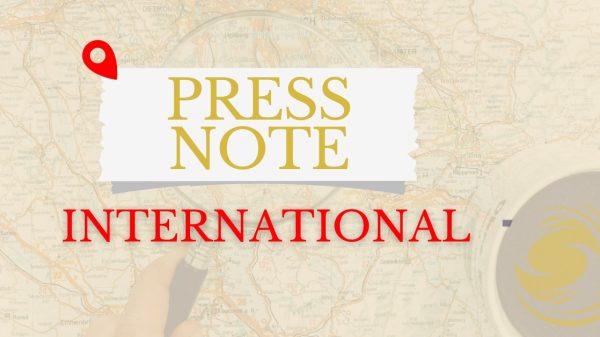BREAKING NEWS
Zelenskyy backs Europe’s joint stance ahead of Trump–Putin Alaska talks

sarakhon desk
Zelenskyy backs Europe’s joint stance ahead of Trump–Putin Alaska talks
Reuters,
Ukrainian President Volodymyr Zelenskyy welcomed a joint message from leaders of France, Germany, Italy, Poland, the UK, Finland and the European Commission stressing that any peace must protect Ukraine’s sovereignty and European security. The statement comes days before U.S. President Donald Trump’s planned meeting with Russia’s Vladimir Putin in Alaska. Kyiv and European capitals warned against any settlement premised on Ukraine ceding territory, arguing it would embolden future aggression. Zelenskyy said the unified European line aligns with Ukraine’s insistence on a “just” end to the war and urged that Ukraine be directly involved in any negotiations. The diplomatic push underscores Europe’s effort to shape talks as Washington explores potential ceasefire options with Moscow.
Armenia–Azerbaijan deal draws cautious optimism and concern after White House signing
AP,
Armenian Prime Minister Nikol Pashinyan and Azerbaijani President Ilham Aliyev signed a U.S.-brokered accord at the White House aimed at ending decades of hostilities, stopping short of a full peace treaty. The agreement envisages reopening transit routes, including a new corridor linking Azerbaijan to Nakhchivan, while leaving key disputes unresolved after Baku’s 2023 takeover of Nagorno-Karabakh. Reactions were mixed: many in Baku praised a shift away from Russian mediation, while Yerevan residents voiced skepticism over concessions and the accord’s ambiguity. The signing, showcased by President Donald Trump, marks a geopolitical pivot in the South Caucasus even as implementation details and security guarantees remain unclear.
Iran rejects transit corridor in Armenia–Azerbaijan pact, signaling regional pushback
Al Jazeera,
Tehran said it opposes the U.S.-backed transit corridor outlined in the Armenia–Azerbaijan agreement, warning the route—planned near Iran’s northern border—could destabilize the area. The stance underscores Iran’s sensitivity to any new cross-border infrastructure it does not control and highlights competing regional ambitions following the White House signing. Iranian objections add complexity to implementing the corridor and indicate potential friction with neighbors just as Washington seeks to lock in post-conflict economic links in the South Caucasus. The response also reflects shifting alignments as regional actors test how far the new deal will reshape trade and influence.
China urges U.S. to ease AI chip controls as part of trade talks
Financial Times,
China is pressing Washington to relax export restrictions on high-bandwidth memory (HBM) chips—critical for advanced AI—as part of ongoing trade negotiations ahead of a possible Trump–Xi summit. The appeal follows selective U.S. relaxations, such as allowing some Nvidia shipments, but HBM limitations remain central to U.S. efforts to constrain China’s AI progress. Easing controls could unlock access for Chinese firms while boosting U.S. chipmakers’ sales, yet risks undercutting Washington’s broader tech-security aims. The talks highlight the uneasy balance between commercial interests and strategic competition shaping the global semiconductor and AI supply chains.
Global criticism mounts over Israeli plan to seize Gaza City
The Guardian,
World leaders and the UN warned Israel against moving to seize Gaza City, citing grave humanitarian risks in a territory already facing acute shortages and displacement. The criticism follows Israel’s security cabinet approving a plan for expanded operations, prompting renewed calls for a ceasefire and hostage releases. London said further escalation would “only bring more bloodshed,” while other governments urged immediate de-escalation and expanded aid access. Israel says it will facilitate humanitarian support outside combat zones, but critics argue an occupation would deepen the crisis and complicate post-war governance. The debate intensifies diplomatic pressure at the UN and in allied capitals.
Thai–Cambodia truce holds as landmine injures Thai soldiers; authorities start border clean-up
Bangkok Post,
Thailand said a ceasefire with Cambodia is largely holding after late-July clashes, but risks persist along contested stretches of the frontier. Three Thai soldiers were injured—one losing a foot—after stepping on a landmine in Sisaket province during a border patrol. Authorities have begun clearing debris and restoring services in affected districts and instructed provincial officials to support residents returning home. Bangkok maintains that recent mine incidents show lingering dangers despite diplomatic efforts and ASEAN engagement to monitor the truce. Communities near the Dangrek Mountains remain wary as both sides assess unexploded ordnance and damage to homes, farms and local infrastructure.












